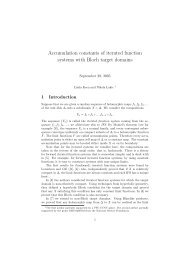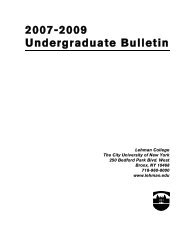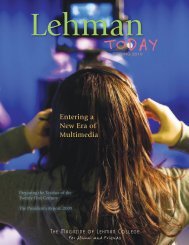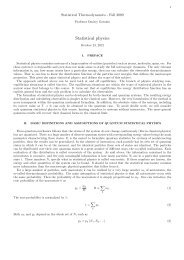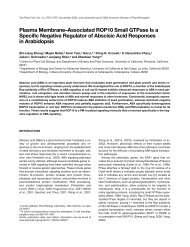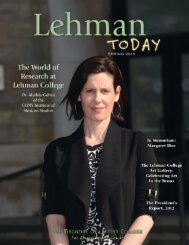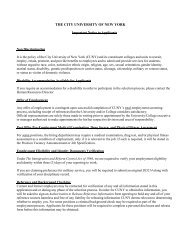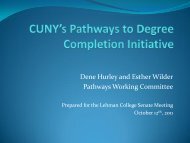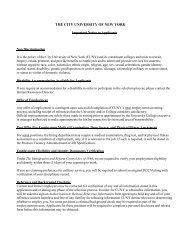Create successful ePaper yourself
Turn your PDF publications into a flip-book with our unique Google optimized e-Paper software.
Stranded in Chile<br />
<strong>Lehman</strong> Alumni Take the Lead in Tourist Evacuation<br />
What began as a long-awaited adventure<br />
in another country turned into a test of resolve, courage, and<br />
leadership skills this winter for three <strong>Lehman</strong> alumni and one<br />
<strong>Lehman</strong> student.<br />
Elías Alcántara (B.A., ‘08), Rafael Almanzar (B.A., ‘09), Elías Santiago<br />
(B.S., ‘10), and art major Amanda Saviñón played a critical<br />
role in helping to evacuate tourists stranded in the midst of a labor<br />
strike in Puerto Natales, Chile. Their teamwork in this crisis won<br />
them formal recognition from the U.S. State Department.<br />
In early January, the friends assembled in Santiago, Chile, where<br />
Alcántara is living after receiving the Organization of American<br />
States Scholarship—one of only three students in the nation, and<br />
the first <strong>Lehman</strong> student ever, to win this prestigious award. He is<br />
pursuing a master’s degree in international studies at the University<br />
of Chile, with additional help provided by a scholarship from the<br />
<strong>Lehman</strong> <strong>College</strong> Foundation.<br />
Before the group headed out for the Magallanes region of Chile,<br />
Alcántara’s professor told him to be careful, alluding to news of<br />
unrest in the area, related to rising gas prices. “He said, ‘It’s going<br />
to be an interesting experience’,” remembers Alcántara.<br />
When the four reached Puerto Natales, where they were scheduled<br />
to stay only for three nights before embarking to Argentina on the<br />
next leg of their trip, they were told that the roads would be closed<br />
for protests. “There were four eighteen-wheelers blocking the road,”<br />
says Alcántara. “We were told that we could walk, but couldn’t drive<br />
in and out by car or bus. The closest Argentine border was twenty<br />
kilometers away, and a friend recommended that we not walk.”<br />
It wasn’t long before other tourists, representing a wide variety of<br />
countries, learned of the blockade. The <strong>Lehman</strong> group recruited<br />
a handful of them near their hostel so they could collectively file<br />
a complaint with the local police. The police, however, replied that<br />
the citizens of Puerto Natales were demonstrating legally, and the<br />
blockade could not be removed.<br />
Alcántara then returned to the hostel and contacted the U.S.<br />
embassy, promising to relay whatever news he gathered to tourists<br />
and assuming the role of spokesperson for the group. Arriving<br />
later that day at the designated meeting location, he found that the<br />
handful of tourists waiting for his update had grown to 600. “I let<br />
them know that the U.S. Embassy was in contact with all the allied<br />
countries’ embassies and that they were following the situation<br />
closely,” he says. “I got some ‘boos’ from the crowd, but I urged<br />
them to also call their embassies.”<br />
Santiago, who graduated with a bachelor’s in computer information<br />
systems, created a Facebook page to disseminate information<br />
to the now 1,600 stranded tourists. The page, “Tourists Stuck<br />
in Southern Patagonia, Chile,” quickly garnered more than 300<br />
“friends” and was<br />
populated with<br />
updates in Spanish<br />
and English. “I<br />
gave out pieces<br />
of paper with<br />
the name of the<br />
Facebook page,”<br />
says Santiago. “I<br />
wanted as much<br />
Left: Elías Alcántara (B.A., ‘08) helps organize the<br />
evacuation (Photo by Amanda Saviñón). Above: Meeting<br />
with the U.S. Deputy Chief of Mission in Santiago<br />
following the evacuation are, from left, Rafael<br />
Almanzar (B.A., ‘09), Elías Santiago (B.S., ‘10),<br />
senior Amanda Saviñón, and Alcantára.<br />
media as possible<br />
to get word<br />
of this so that we<br />
could mobilize<br />
faster.” He also<br />
uploaded photos<br />
and videos.<br />
When the local school became the official Red Cross holding location,<br />
Almanzar became the bilingual point person, helping people<br />
to remain calm and passing on information that Alcántara gathered<br />
during his hourly calls to the embassy; Alcántara had now become<br />
the U.S. Embassy’s official spokesperson. Saviñón, who was spending<br />
her spring semester at the University of Chile, documented the<br />
situation with her camera and lent a helping hand where she could.<br />
Later on, after buses had evacuated all the tourists out of the area,<br />
the <strong>Lehman</strong> group met in Santiago with U.S. Embassy representatives<br />
and were presented with certificates of appreciation for their<br />
work. “It was cool that the people at the Embassy called us the<br />
‘crisis’ team,” says Santiago. “After all of this, I wish I could learn a<br />
lot more languages than I know now.” <br />
<strong>Lehman</strong> Today/<strong>Spring</strong> <strong>2011</strong> 19



